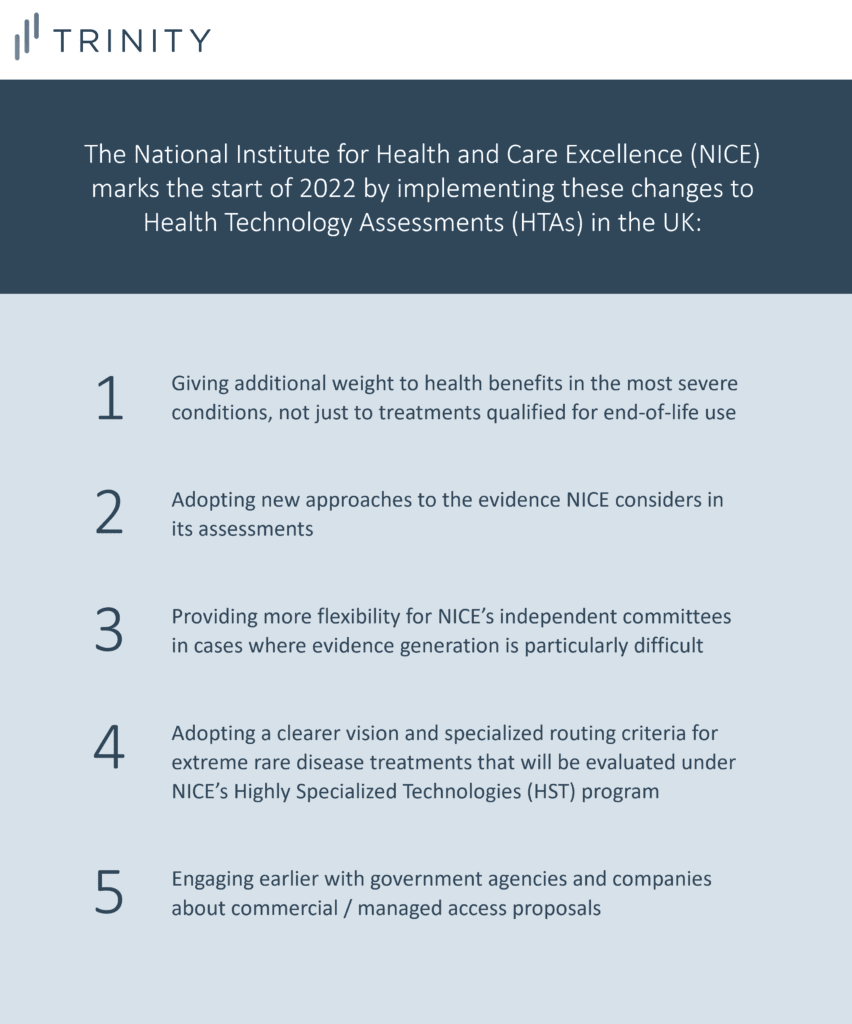Home / Intelligence / Blog / Key Changes to Health Technology Assessments (HTAs) in the UK
Published February 2, 2022

The National Institute for Health and Care Excellence (NICE) will mark the start of 2022 by implementing changes to health technology assessments (HTAs), demonstrating adaptability of regulatory bodies as medical technologies continue to evolve. The final HTA changes aim to provide earlier and more equitable access to treatments as well as display increased flexibility in the evaluation of new health technologies. As part of NICE’s plan to modernize healthcare, the changes will apply to both digital therapeutics as well as pharmaceutical products.

New NICE Evaluation Guidelines Will Take Effect in February 2022
NICE will adopt a ‘rolling’ review and evolution of all evaluation guidelines, prioritizing real world evidence (RWE), and customizing evaluations to best assess novel innovations (e.g., acknowledging unique requirements of personalized medicine vs. digital therapeutics) in an agile manner. The impact of the changes will likely not be seen until later in the year as the new evaluation process comes into effect starting next month, but competition can be expected between the UK and the EU for the initial launch of new innovative treatments. A faster assessment adds appeal for companies, especially those that may need to prioritize resources across markets.
The Evolution of NICE Guidelines With Novel Innovations, Including Digital Therapeutics
The new tailored approach for assessment also paves the way for increasing the availability of innovative treatments, including digital therapeutic products; Professor Gillian Leng, NICE chief executive, said that “our vision at NICE is to be at the forefront of delivering access for patients in the NHS to valuable, evidence-based innovative medicines, medical devices and diagnostics,” with the goal of the new updates to enable NICE to “remain cutting edge as the healthcare landscape continues to evolve.”
By Crystal Zhao and Kate Watkins
Related Intelligence
White Papers
2023 NRDL Pricing Implementation and Market Access Outcomes Update
The National Reimbursement Drug List (NRDL) negotiations are expected to conclude by November 2024, with pricing outcomes gradually being revealed starting in January 2025. The Trinity Life Sciences team has reviewed the 2023 NRDL inclusion and pricing results, drawing some key learnings.
Read More
Blog
Rise with the Waves: UK – Now and Beyond – Four Policy Trends That May Shape Pharma’s Future
Executive Summary The global payer landscape is rapidly evolving and is expected to continuously impact manufacturers’ decisions about new launches, portfolio management, trial design and importantly, pricing and market access strategy. In the UK, several policy reforms have been introduced which are expected to improve patient access while balancing financial healthcare sustainability and overall market […]
Read More
Blog
Japan Pricing Policy Reform 2024
Executive Summary The Central Social Insurance Medical Council, the key Japanese reimbursement policy panel known as Chuikyo, introduced the 2024 drug pricing reform in April 2024. Some key features of the reform plan include: The reform outlines a suite of measures aimed at driving innovation while also addressing drug lags (delay in manufacturers launching drugs in Japan […]
Read More
